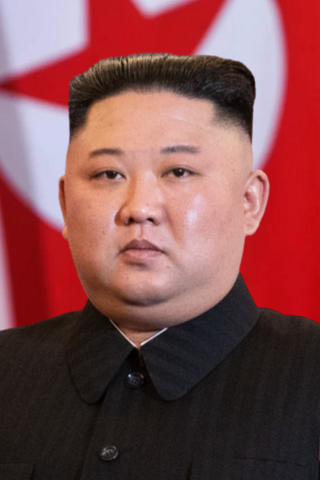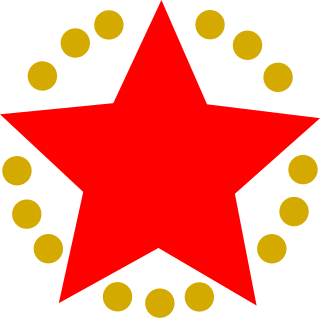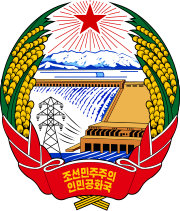
The General Secretary of the Workers' Party of Korea is the leader of the Workers' Party of Korea (WPK), the ruling party in North Korea, and the country's supreme leader. Party rules stipulate that the party congress elects the general secretary. The party conference and the Central Committee are empowered to remove and elect the party leader. The general secretary is "ex officio" Chairman of the WPK Central Military Commission and leads the work of the secretariat. Additionally, the general secretary is by right of office member of the WPK Presidium, the WPK Politburo and the WPK Secretariat.

The 6th Central Committee of the Workers' Party of Korea was elected by the 6th Congress on 14 October 1980, and remained in session until the election of the 7th Central Committee on 9 May 2016. The Central Committee composition was replenished by the 3rd WPK Conference. In between party congresses and specially convened conferences the Central Committee is the highest decision-making institution in the WPK and North Korea. The Central Committee is not a permanent institution and delegates day-to-day work to elected bodies, such as the Presidium, the Politburo, the Secretariat, the Central Military Commission and the Control Commission in the case of the 6th Central Committee. It convenes meetings, known as "Plenary Session of the [term] Central Committee", to discuss major policies. Only full members have the right to vote, but if a full member cannot attend a plenary session, the person's spot is taken over by an alternate. Plenary session can also be attended by non-members, such meetings are known as "Enlarged Plenary Session", to participate in the committee's discussions.

The 5th Central Committee of the Workers' Party of Korea (WPK) was elected at the 5th Congress on 13 November 1970. and remained in session until the election of the 6th Central Committee on 14 October 1980. In between party congresses and specially convened conferences the Central Committee is the highest decision-making institution in the WPK and North Korea. The Central Committee is not a permanent institution and delegates day-to-day work to elected bodies, such as the Political Committee, the Secretariat and the Inspection Committee in the case of the 5th Central Committee. It convenes meetings, known as "Plenary Session of the [term] Central Committee", to discuss major policies. Only full members have the right to vote, but if a full member cannot attend a plenary session, the person's spot is taken over by an alternate. Plenary session can also be attended by non-members, such meetings are known as "Enlarged Plenary Session", to participate in the committee's discussions.

The 3rd Central Committee of the Workers' Party of Korea (WPK) was elected at the 3rd Congress on 29 April 1956, and remained in session until the election of the 4th Central Committee on 18 September 1961. In between party congresses and specially convened conferences the Central Committee is the highest decision-making institution in the WPK and North Korea. The Central Committee is not a permanent institution and delegates day-to-day work to elected bodies, such as the Standing Committee, the Organisation Committee and the Inspection Committee in the case of the 3rd Central Committee. It convenes meetings, known as "[month] Plenary Session of the Central Committee", to discuss major policies. Only full members have the right to vote, but if a full member cannot attend a plenary session, the person's spot is taken over by an alternate. Plenary session can also be attended by non-members, such meetings are known as "Enlarged Plenary Session", to participate in the committee's discussions.

The 4th Central Committee of the Workers' Party of Korea (WPK) was elected at the 4th Congress on 18 September 1961. and remained in session until the election of the 5th Central Committee on 13 November 1970. In between party congresses and specially convened conferences the Central Committee is the highest decision-making institution in the WPK and North Korea. The Central Committee is not a permanent institution and delegates day-to-day work to elected bodies, such as the Political Committee, the Secretariat and the Inspection Committee in the case of the 4th Central Committee. It convenes meetings, known as "Plenary Session of the [term] Central Committee", to discuss major policies. Only full members have the right to vote, but if a full member cannot attend a plenary session, the person's spot is taken over by an alternate. Plenary session can also be attended by non-members, such meetings are known as "Enlarged Plenary Session", to participate in the committee's discussions.
The 4th Political Committee of the Workers' Party of Korea (WPK), officially the Political Committee of the 4th Central Committee (4th CC), was elected in the immediate aftermath of the 4th WPK Congress on 18 September 1961 by the 4th CC's 1st Plenary Session.
The 4th Central Auditing Committee (CAC) of the Workers' Party of Korea (WPK), officially the Central Auditing Committee of the 4th Congress of the Workers' Party of Korea, was elected by the 4th Congress on 19 September 1961.

Members of the Control Commission (CC) of the Workers' Party of Korea were elected by the 1st Plenary Session of a WPK Central Committee. In the two predecessor organisations, the Central Inspection Commission of the Workers' Party of North Korea (WPNK) and the Inspection Committee of the Workers' Party of South Korea (WPSK), members were elected by the party congress. Control Commission members were responsible for ensuring party discipline, enforcing and protecting the party rules, and punishing members who breached rules and regulations.

The 1st Standing Committee of the Supreme People's Assembly (SPA) was elected by the 1st Session of the 1st Supreme People's Assembly on 10 September 1948. It was replaced on 20 September 1957 by the 2nd SPA Standing Committee.

The 2nd Standing Committee of the Supreme People's Assembly (SPA) was elected by the 1st Session of the 2nd Supreme People's Assembly on 20 September 1957. It was replaced on 23 October 1962 by the 3rd SPA Standing Committee.

The Committees of the 2nd Supreme People's Assembly (SPA) of North Korea was elected by the 1st Session of the 2nd SPA on 20 September 1957. They were replaced on 23 October 1962 by the committees of the 3rd Supreme People's Assembly.

The 2nd Cabinet of North Korea was elected by the 1st Session of the 2nd Supreme People's Assembly on 20 September 1957. It was replaced on 23 October 1962 by the 3rd Cabinet.

The 3rd Cabinet of North Korea was elected by the 1st Session of the 3rd Supreme People's Assembly on 23 October 1962. It was replaced on 16 December 1967 by the 4th Cabinet.

The 4th Cabinet of North Korea was elected by the 1st Session of the 4th Supreme People's Assembly on 16 December 1967. It was replaced on 26 December 1972 by the 5th Administrative Council.

The 10th Cabinet of North Korea was elected by the 1st Session of the 10th Supreme People's Assembly of North Korea on 5 September 1998. It was replaced on 3 September 2003 by the 11th Cabinet.

The 11th Cabinet of North Korea was elected by the 1st Session of the 11th Supreme People's Assembly of North Korea on 3 September 2003. It was replaced on 9 April 2009 by the 12th Cabinet.

The 1st Supreme People's Assembly (SPA) was elected on 25 August 1948 and convened for its first session on 2 September 1948. It was replaced on 18 September 1957 by the 2nd Supreme People's Assembly. It convened for its first meeting on 2–10 1948, which discussed and adopted the constitution of the Democratic People's Republic of Korea.

The 2nd Supreme People's Assembly (SPA) in North Korea was elected on 27 August 1957 and convened for its first session on 18–20 September 1957. It was replaced on 23 October 1962 by the 3rd Supreme People's Assembly.
Chin Pan-su was a North Korean politician who served as minister in the North Korean cabinet and member of the 2nd Politburo of the Workers' Party of Korea.
Kim Ik-son was a North Korean politician who served in various party and government positions including as the first chairman of the Central Court of North Korea.






